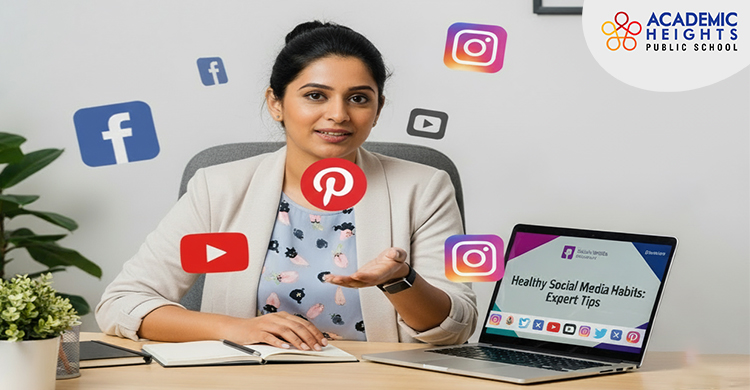The impact of social media on teenagers is almost everywhere. You like, post, and scroll, feeling connected to trends and friends, but sometimes flooded by comparison and pressure. Social media opens doors where you can explore ideas, express yourself, and find support. But it can also stir anxiety, self-doubt, and stress. Understanding its influence helps you navigate the fine line between well-being and connection. You can use it effectively if you are aware of both its advantages and disadvantages.
What Is Social Media and Why Do Teenagers Use It?

Online platforms that facilitate communication, connection, and content sharing are referred to as the impact of social media. These platforms are a major component of teens’ social and digital experiences, as they enable them to communicate with others, explore ideas, stay updated, and follow trends.
- Social connection and friendships: Digital platforms that allow users to engage and build relationships are referred to as social media. Teens find it to be a vital place to develop their social ties, maintain relationships with their peers, share special moments, and feel a sense of inclusion within a group.
- Identity Exploration: Teenagers can explore their identities on social media by expressing themselves, experimenting with various personas, and reflecting on their interests and values. They engage in self-discovery, acquire feedback, and shape their social and personal identities. In a digital setting by exchanging content and interacting with peers.
- Finding Community & Support: Teenagers can find support and a sense of community on social media. They interact with peers going through similar things, ask for advice, and freely express themselves through groups, forums, and common interests. They feel more understood, supported, and less alone in their struggles because they have a sense of belonging.
- Creativity and Self-Expression: Teenagers use social media as a platform to express their uniqueness and experiment with creativity. It enables them to create content, share personal narratives, and try out various artistic mediums or concepts while establishing connections with audiences. Those who value, support, and encourage their distinct voices.
- Learning and Information: Social media is a resource for information access and education. Adolescents use it to find educational content, follow pages that provide information. Take this part in discussions, and keep up with current affairs. It provides easy access to information, a range of viewpoints, and tools that promote learning and development on a personal level.
- Entertainment and relaxation: Social media is a popular source of amusement and relaxation for teenagers. They use it to escape from everyday stress, enjoy funny or imaginative content, and engage in interactive experiences. It offers a practical way for them to relax, enjoy themselves, and clear their heads without having to leave the comforts of home.
How Social Media Impacts Teenagers’ Mental Health
There is a significant impact of social media on teenage mental health. It provides chances for self-expression, connection, and education. On the other hand, comparison, cyberbullying, and excessive screen time can also lead to anxiety, stress, low self-esteem, and depression. To promote emotional health and normal social development during adolescence. It is crucial to strike a balance between online and offline activities.
Positive Impacts of Social Media on Teenagers
Teenagers benefit from social media because it facilitates communication, encourages creativity, and gives them access to information. It supports learning and personal development in a digital world by assisting them in expressing themselves, finding interests, forming social connections, and staying informed.
- Fostering Connection and Community: Teens can stay in touch with friends, connect with like-minded peers, and share experiences through social media, which helps them create communities and connections. Teens can feel included, understood, and connected in a variety of online communities thanks to their ability to foster a sense of belonging, promote teamwork, and offer support systems.
- Providing Support and Information: Teenagers can access helpful information and support systems through social media. They can join communities based on interests, connect with peers going through similar struggles, and ask for help or advice. Additionally, it provides updates and educational resources to help teens stay informed, feel understood, and successfully handle academic or personal obstacles.
- Promoting Self-Expression: Teenagers can express their uniqueness, share their creativity, and pursue their passions due to social media. They can express their ideas, display their skills, and develop their identities through posts, videos, and interactive content. They can connect with peers who value and support their self-expression through this platform, which also fosters authenticity and confidence.
- Improving Communication and Social Skills: Through platforms for interaction, collaboration, and idea expression, social media helps teenagers develop their social and communication skills. It promotes dialogue, collaboration, and peer-to-peer exchange of ideas, which builds self-assurance, empathy, and flexibility while facilitating relationships with a variety of groups outside of one’s immediate social circle.
- Encouraging healthy identity exploration: Adolescents have an opportunity to explore and develop their identities because of social media. They can experiment safely, find their passions, and build confidence by exchanging ideas. This involves taking up new hobbies and interacting with diverse communities. This promotes self-awareness and personal development in a vibrant and dynamic digital environment.
Negative Impacts of Social Media on Teenagers
Teenage mental health, concentration, and general well-being can all be adversely affected by social media. It is crucial to use technology mindfully and in moderation because excessive use or exposure to harmful content can cause stress, distraction, or emotional difficulties.
- Body image issues and low self-esteem: The impact of social media on teenagers can be negatively impacted by excessive social media use. Continuously being exposed to comparisons and idealised pictures can cause insecurity, discontent, and a poor opinion of oneself. This pressure to live up to inflated expectations can lead to anxiety, stress, and a loss of confidence. This can negatively impact adolescent mental health and general well-being.
- Sleep Disruption: Teenagers’ sleep patterns can be disturbed by excessive social media use. Screen time, notifications, and late-night scrolling disrupt sleep cycles, resulting in mood swings, exhaustion, and diminished focus. Moderation and good digital habits are crucial because sleep deprivation over time impairs general health, academic achievement, and emotional stability.
- Screen Addiction: Teenagers who use social media may develop a screen addiction that keeps them glued to their gadgets for hours on end. Their productivity, emotional health, and general well-being are all adversely affected by this continuous engagement. Also interferes with sleep, impairs focus, and restricts in-person interactions.
- Anxiety, Depression, and Loneliness: Adolescents using social media excessively may experience increased anxiety, sadness, and loneliness. Despite being constantly connected in the digital world, teenagers who spend too much time on screens may experience loneliness, stress, and emotional exhaustion. Constant comparisons, online criticism, and cyberbullying can undermine their self-esteem.
- Distraction and poor academic performance: Excessive use of social media by teenagers may distract them from their studies, which could lower their academic performance. Time and attention are consumed by constant notifications, scrolling, and online interactions. These distractions hinder task completion, information retention, and the development of productive study habits. These behaviours eventually impact learning outcomes and the advancement of education as a whole.
Expert Recommendations for Healthy Social Media Use

The impact of social media on teens can be balanced by setting time limits, balancing offline and online activities. Experts also recommend sharing constructive content and keeping an eye on interactions, all of which are advised by experts. Teenagers can use social media responsibly while safeguarding their mental and emotional health . They can do this by practising mindfulness, communicating openly, and taking digital breaks.
- Set Time Limits: Experts advise setting time limits for social media use to encourage balance and avoid overuse. Teenagers who set aside specific times for online activity are better able to concentrate on their studies, hobbies, and in-person interactions. This helps them manage their screen time, minimise distractions, and maintain healthy daily routines and mental health.
- Be Mindful of Your Use: By establishing boundaries, monitoring screen time, and considering one’s online behaviour, experts advise using social media with awareness. Adolescents should prioritise meaningful interactions, refrain from mindless scrolling. They should also balance between online and offline activities to make sure social media promotes wellbeing rather than diversion or stress.
- Turn off unnecessary notifications: To cut down on distractions and preserve focus, experts advise disabling pointless social media alerts. Teenagers can improve their time management, focus on their studies or offline activities, and avoid constant distractions by limiting alerts. This encourages better screen habits, increased focus, and a balanced approach to online engagement.
- Avoid controversial or harmful content: To safeguard the impact of social media on teenagers’ mental and emotional health, experts advise them to steer clear of content that is controversial or damaging. By avoiding unpleasant conversations, false information, or upsetting content, one can preserve a positive online experience and reduce stress. This also encourages safer, more productive interactions and creates a healthier digital environment.
- Protect personal information and privacy: Experts advise teenagers to use strong passwords, modify privacy settings on social media. They should also avoid sharing sensitive information online to safeguard their privacy and personal information on social media. Young users can have a safer, more secure, and more responsible online experience by exercising caution when accepting friend requests and leaving digital traces.
Conclusion:-
Social media and mental health greatly impact teenagers’ lives because it provides them with chances for self-expression, entertainment, and connection. But there are drawbacks as well, like stress, distraction, and privacy concerns. In a quickly changing digital world, teenagers can maximise positive effects while minimising negative ones. They can achieve this by balancing their online and offline activities, using technology mindfully, and adhering to professional advice. This promotes healthier habits, personal development, and general well-being. For deeper insights, read the AHPS blog on How to Overcome Social Media Addiction.
